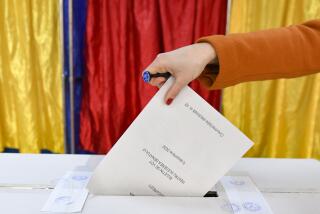South American Democracy Often Lacks Solid Roots
- Share via
RIO DE JANEIRO — Often, what is called democracy in South America would be barely recognizable in North America.
The word is used loosely to mean civilian government, which now exists in all the continent’s 12 independent nations.
But in Brazil and Argentina, presidents can make laws by decree. The armed forces often are seen as arbiters of democracy and have great political influence.
Many countries are run by small, traditional elites separated from the people by chasms of wealth, education, race, even language.
“Democracy isn’t really there,” said Hernando de Soto, head of the Liberty and Democracy Institute, a private foundation in Peru. “We’ve got all the organization, like the executive branch, the legislative branch and the judiciary, but none of the underpinning institutions.
“These organizations are not under control of public opinion. They’ve got blank checks.”
Democracy has no deep roots in South America.
Conquistadors from Spain and Portugal left a legacy of imperial rule. The king’s friends ran things and “the people” took orders.
Independence gave rise to a new type of charismatic leader: the caudillo, or “man on horseback,” originally modeled on the South American liberator, Simon Bolivar.
Leaders often saw legislatures and the courts as window dressing, to be bribed or coerced. Corruption became endemic and the key was who you knew.
“It’s no use changing the government or the laws,” said Roberto DaMatta, a Brazilian anthropologist.
“The system is personalized and so is the repression: It only affects those who don’t have friends in power.”
More to Read
Sign up for Essential California
The most important California stories and recommendations in your inbox every morning.
You may occasionally receive promotional content from the Los Angeles Times.













